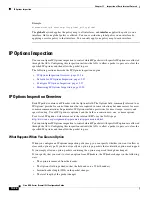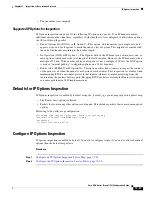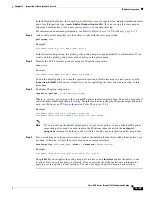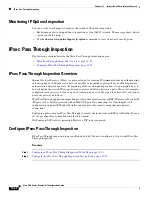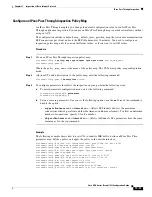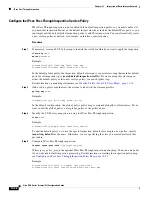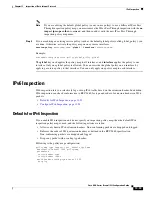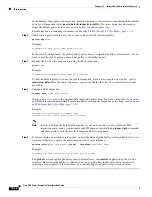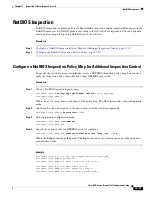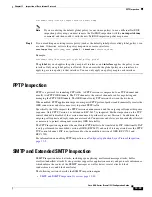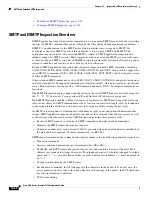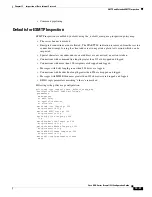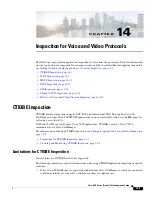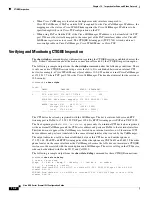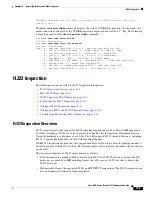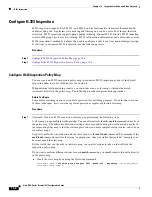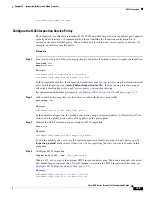
13-40
Cisco ASA Series Firewall CLI Configuration Guide
Chapter 13 Inspection of Basic Internet Protocols
SMTP and Extended SMTP Inspection
•
Defaults for ESMTP Inspection, page 13-41
•
Configure ESMTP Inspection, page 13-42
SMTP and ESMTP Inspection Overview
ESMTP application inspection provides improved protection against SMTP-based attacks by restricting
the types of SMTP commands that can pass through the ASA and by adding monitoring capabilities.
ESMTP is an enhancement to the SMTP protocol and is similar is most respects to SMTP. For
convenience, the term SMTP is used in this document to refer to both SMTP and ESMTP. The
application inspection process for extended SMTP is similar to SMTP application inspection and
includes support for SMTP sessions. Most commands used in an extended SMTP session are the same
as those used in an SMTP session but an ESMTP session is considerably faster and offers more options
related to reliability and security, such as delivery status notification.
Extended SMTP application inspection adds support for these extended SMTP commands, including
AUTH, EHLO, ETRN, HELP, SAML, SEND, SOML, STARTTLS
,
and VRFY
. Along with the support for
seven RFC 821 commands (DATA,
HELO, MAIL, NOOP, QUIT, RCPT, RSET), the
ASA supports a total
of fifteen SMTP commands.
Other extended SMTP commands, such as
ATRN
,
ONEX
,
VERB
,
CHUNKING
, and private extensions
and are not supported. Unsupported commands are translated into Xs, which are rejected by the internal
server. This results in a message such as “500 Command unknown: 'XXX'.” Incomplete commands are
discarded.
The ESMTP inspection engine changes the characters in the server SMTP banner to asterisks except for
the “2”, “0”, “0” characters. Carriage return (CR) and linefeed (LF) characters are ignored.
With SMTP inspection enabled, a Telnet session used for interactive SMTP may hang if the following
rules are not observed: SMTP commands must be at least four characters in length; must be terminated
with carriage return and line feed; and must wait for a response before issuing the next reply.
An SMTP server responds to client requests with numeric reply codes and optional human-readable
strings. SMTP application inspection controls and reduces the commands that the user can use as well
as the messages that the server returns. SMTP inspection performs three primary tasks:
•
Restricts SMTP requests to seven basic SMTP commands and eight extended commands.
•
Monitors the SMTP command-response sequence.
•
Generates an audit trail—Audit record 108002 is generated when an invalid character embedded in
the mail address is replaced. For more information, see RFC 821.
SMTP inspection monitors the command and response sequence for the following
anomalous signatures:
•
Truncated commands.
•
Incorrect command termination (not terminated with <CR><LR>).
•
The MAIL and RCPT commands specify who are the sender and the receiver of the mail. Mail
addresses are scanned for strange characters. The pipeline character (|) is deleted (changed to a blank
space) and “<” ‚”>” are only allowed if they are used to define a mail address (“>” must be preceded
by “<”).
•
Unexpected transition by the SMTP server.
•
For unknown commands, the ASA changes all the characters in the packet to X. In this case, the
server generates an error code to the client. Because of the change in the packet, the TCP checksum
has to be recalculated or adjusted.
•
TCP stream editing.
Summary of Contents for ASA 5508-X
Page 11: ...P A R T 1 Access Control ...
Page 12: ......
Page 157: ...P A R T 2 Network Address Translation ...
Page 158: ......
Page 233: ...P A R T 3 Service Policies and Application Inspection ...
Page 234: ......
Page 379: ...P A R T 4 Connection Management and Threat Detection ...
Page 380: ......

